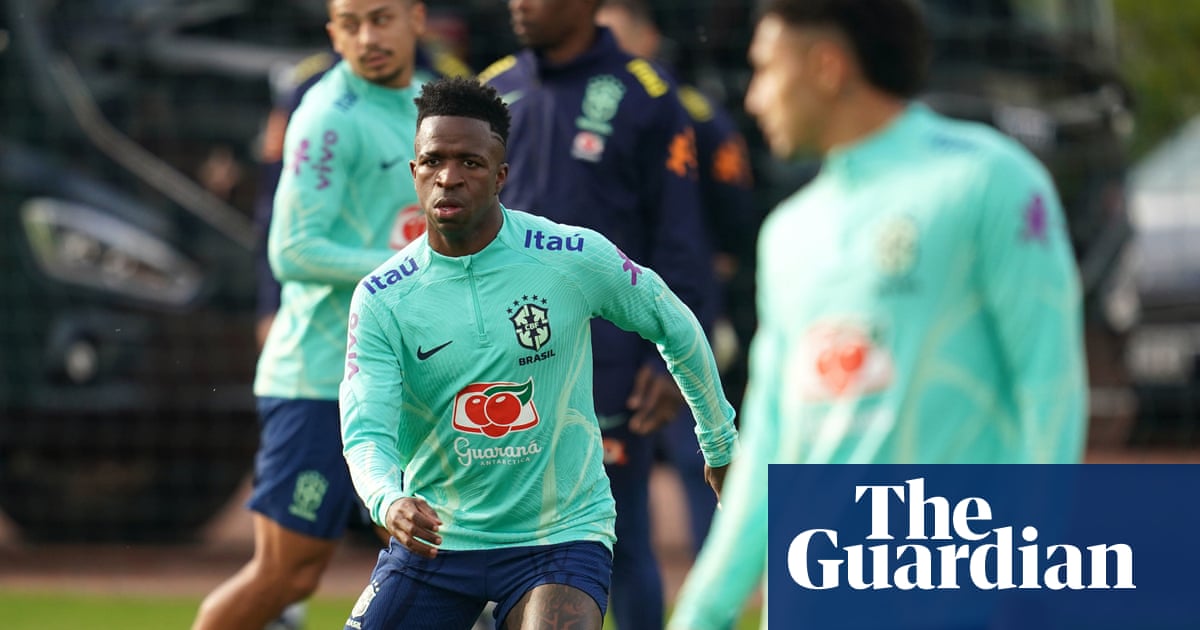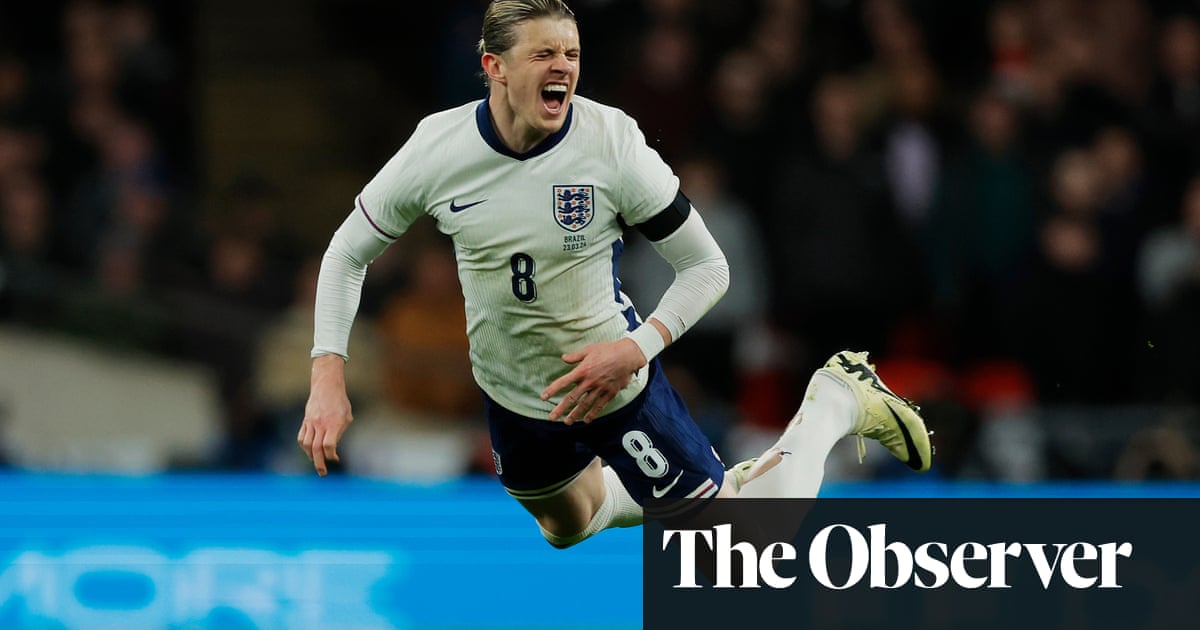
Almost three years ago, at the Olympiastadion in Berlin, the Euro 2024 logo was officially launched, featuring the colours of all 55 Uefa member nations in a symbolic display of continental solidarity. “It shows that in Europe we are united, we are friends,” the Uefa president, Aleksander Ceferin, announced of the new design. “Football is about friendship, it’s about good values, different cultures uniting.”
Friendship. Good values. Everyone united. Yes, good luck with all that. Perhaps it would be unnecessarily harsh to point out that just a few months after Ceferin spoke these words, Europe would be embroiled in its biggest land war since 1945, a crisis of identity and division from which the continent is still forlornly trying to extricate itself.
Predictions, a mug’s game, and all that. But the point to make here is that if football’s administrators are going to make these sorts of grandiose, messianic claims for the sport, then it’s only fair to hold them up to the light of reality every now and again. Is football really about friendship? Is it about good values, different cultures uniting, Xherdan Shaqiri and Aleksandar Mitrovic sat round a campfire playing the banjo?
Or is it simply the greatest and silliest pastime humanity has yet invented for itself, a seething mass of tribal rivalry and hollow escapism and performative debauchery set against the backdrop of some of the most sublime athletic feats ever conceived? Let’s find out! Fingers on remote-control buttons. Wallcharts and office sweepstakes at the ready. Fireworks delicately lodged in buttock cracks. Euro 2024 is about to detonate.
Not literally, we hope. The prospect of genuine trouble is small but real, driven as much by a populist fetish for “security” and riot gear as by any credible threat. For certain sections of the media and the political class, there is often a sense that football disorder is almost willed into being through craving and incantation.
In Britain, the silliness has already ramped up. The fatuous supercomputer and AI predictions, the betting company stunts, the tenuous commercial tie-ups (fun tip: try to spot all the creative ways in which brands mention the Euros this summer without troubling the intellectual property lawyers), the inevitable political piggybacking. The UK general election – landing in between the last 16 and the quarter-finals – can be soundly relied upon to generate the usual toxic discourse, bad tweets and cringeworthy photos of politicians pumping their fists at the telly.
All of which briefly threatens to obscure the fact that for England and Scotland, there is a justified sense of optimism, two long-term projects that may be about to crest their peak. For Scotland a run of seven games without a win between September and March has not obscured the progress made in the five years under Steve Clarke, during which a core of seasoned international veterans has grown together, triumphed and suffered together, grown closer through the bleak nights and the boogie nights. They qualified with two games to spare, made Rodri foam at the mouth, upstaged Erling Haaland in his backyard. They will fear nobody.
The issue – and not a new one, really – is where the goals are going to come from. Che Adams is bustling but hardly prolific. They are still only the fourth-ranked team in their group. They have still never made the second phase of a major tournament. But opening night in Munich, with the hosts taut and anxious, would be the perfect opportunity to spring an ambush. Get something there, and anything can happen.
England’s optimism, too, is based on more than the usual charms and wishes. In Jude Bellingham, Harry Kane and Phil Foden they can boast arguably the best players in La Liga, the Bundesliga and the Premier League. Throw in Bukayo Saka and Cole Palmer, Declan Rice and Jack Grealish, Trent Alexander-Arnold and Kobbie Mainoo, and you have a depth of individual technical quality that is the envy of pretty much everyone in Europe.
And at this point, of course, we hit a problem: individual technical quality wins you nothing on its own. Playing Saka at left wing-back and Bellingham at the base of midfield might fit in all the available attacking talent, and certainly looks good on a pub napkin. But in the 18 short months since the last World Cup, England’s problem has been at the other end: a systemic failure to keep clean sheets against elite opposition in the big games. Something always seems to crack. The lack of natural left-footers makes them a sitting target on that flank. England have the means. Whether they have the ends remains to be seen.
And it is stability at the back, rather than flair at the top, that most reliably wins Euros. Three years ago Italy and England had the two best defences in the tournament. Five years before that Portugal grimaced their way to victory at Euro 2016 despite somehow only managing to win one of their seven games in 90 minutes. Greece in 2004 (getting everyone behind the ball) and Spain in 2008 and 2012 (not letting anyone else have the ball) employed radically different strategies but to a common end.
What does this tell us? It tells us that once again Portugal, who had the best defensive record in qualifying, are in the mix. With Roberto Martínez in charge, much of the attention has naturally focused on the rich seam of attacking talent, where at least three of Rafael Leão, Gonçalo Ramos, Diogo Jota, João Felix, Bernardo Silva, Bruno Fernandes and Cristiano Ronaldo (yes, still there) will have to be left out. But it is at the back, where a richly experienced constellation of legends – Rúben Dias, João Cancelo, Pepe (yes, still there) – will hustle, scrape and shithouse everything that comes their way.
The Nations League champions, Spain, by contrast, will lean heavily on youth, with the 21-year-old Pedri now a relative veteran alongside the Barcelona prodigies Pau Cubarsí (17) and Lamine Yamal (16). And if Luis de la Fuente’s side is a little short on star wattage compared to previous versions, then there is also a unity and cohesion there, driven in part by their experience of playing together at age-group level.
Their Group B rivals Italy are defending champions, even if barely a handful of the 2021 team have survived the cut under Luciano Spalletti. With the core of Simone Inzaghi’s extraordinary Inter side to call on, they look a formidable prospect on paper. But they feel just a little brittle, just a little underpowered.
France will go into the tournament as joint-favourites with England, even if recent results have exposed defensive frailties. The surprising recall of N’Golo Kanté is probably an admission that Didier Deschamps craves a little more stability and security, that he foresees situations further down the line that not even Kylian Mbappé and the retiring Olivier Giroud will be able to salvage for them.
Belgium and the Netherlands are well-equipped outsiders. Croatia and Denmark have probably had their time. Jan Oblak will play his first international tournament for Slovenia; Robert Lewandowski is probably playing his last for Poland. Georgia, helmed by the sparkling Khvicha Kvaratskhelia and enduring their own political tumult at the minute, will make their debut alongside Serbia. Ukraine have an intriguingly kind draw and will attract plenty of diaspora support. They remind us, too, that this is a tournament taking place in the foothills of human tragedy, at a time when the European project itself – the postwar spirit that birthed so many of the continent’s institutions – has never felt more contested or divided.
And few countries express this dilemma better than the host nation, a country that has always liked to think of itself as Europe’s heart and lungs, its engine room and its moral centre. For Germany, Euro 2024 arrives with a certain quantum of trepidation: over political unrest, over security and policing, over the trains and whether they will run on time, over the lack of striking options to challenge big Niclas Füllkrug, over their terrible recent tournament record.
But as public buildings have been liveried and results have improved, a nation in the grip of a nascent declinism has briefly, cautiously, allowed itself to dream again. The 2006 World Cup parallels are probably laid on a little thick, but in coach Julian Nagelsmann, midfielders Jamal Musiala and Florian Wirtz, the reborn Kai Havertz and the indomitable Antonio Rüdiger, Germany again has a chance to show the world a different side of itself. A country that works, however fleetingly. A country that unites, however illusorily.
And really, short of armed conflict only football still has the power to bring people together like this. Moreover, amid the growing perversions of the club game, the widening greed and disconnect, the many corruptions of Fifa, there remains at the heart of the European Championship a tiny kernel of something pure, something that can’t be bought and sold by a wealth fund, something that can’t be shipped to Saudi Arabia or Donald Trump’s America. We are not united. We are not friends. But – and this will have to do for now – we are all watching.
Europe may be seething and rent, torn apart by rivalries and skirmishes and history and politics and language, and whether “It’s coming home” is wistful lament or imperial bombast, and whether soup counts as a meal or not. But somehow, for all its planes of division, this is still our Europe, and for four weeks this is our Euros. To enmity! To disunity! To different cultures clashing! To bad values!












